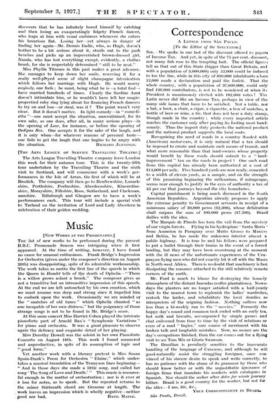Correspondence
A LETTER FROM SAO PAULO.
[To the Editor of the SPECTATOR.] SIR,—We spoke in our last of the discount offered to payers of Income Tax. And yet, in spite of the 75 per cent. discount, not many fish rose to the tempting bait. The official figures tell us that out of this State (bigger than Great Britain, and with a population of 3,000,000) only 52,000 could be induced to toe the line, while in this city of 800,000 inhabitants a bare 12,000 made a declaration and paid the forfeit. That the whole country, with a population of 37,000,000, could only find 136,000 contributors, is not to be wondered at when its President is unanimously elected with 102,000 votes ! The Latin never did like an Income Tax, perhaps in view of the many side issues that have to be satisfied. Not a table, nor a hat, a boot, a chair, a cigar, a cigarette, a box of matches, a bottle of beer or wine, a tie, that does not bear a duty stamp, though made in the country ; while every imported article reaches the customer only after paying its footing most hand- somely. Thus the import duty protects the national product and the national product supports the local costs.
Recognizing the need of roads in a country flooded with (American) motor-ears, it is only natural that a tax should be imposed to create and maintain such means of transit, and what more reasonable than that land-owners whose property would benefit by these roads should submit to a " land- improvement " tax on the roads in project ? One such road from this capital has already been authorized at a cost of £14,000 per mile. Five hundred yards are now ready, cemented to a width of eleven yards, as a sample, and on the strength of this promising beginning the millennium, if miragesque, seems near enough to justify in the eyes of authority a tax of £5 per car that journeys beyond the city boundaries.
Capital punishment is being much discussed in the South American Republics. Argentina already proposes to apply the extreme penalty to Government servants in receipt of a minimum salary of 30,000 pesos (f2,300), whose defalcation shall surpass the sum of 100,000 pesos (t7,500). Brazil dallies with the idea.
The Marquis de Pinedo has torn the veil from the mystery of our virgin forests. Flying in his hydroplane Santa Maria ' from Asuncion in Paraguay over Matto Grosso to Manios and Belem, he has made the unknown interior almost a public highway. It is true he and his fellows were prepared to put a bullet through their brains in the event of a forced landing, but they may have been overstrung at the moment with the ill news of the unfortunate experiences of the Uru- guayan flying men who did not exactly hit it off with the Moors in North-west Africa. There is no doubt that machinery is fast dissipating the romance attached to the still relatively remote corners of the earth.
Mr. Ford is much to blame for destroying the homely atmosphere of the distant fazendas (coffee plantations). Nowa- days the planters are no longer satisfied with a half-yearly visit to the nearest town to replenish the ladies' wardrobes, restock the larder, and rehabilitate the local dandies as interpreters of the reigning fashion. Nothing suffices now less than a bi-weekly run to the " movies." Formerly the happy day's round and common task ended with an early tea, hot milk and biscuits, accompanied by simple games and chat enlivened from time to time by the visit of relations or even of a mad " Inglez," sure source of merriment with his broken talk and laughable mistakes. Now, no sooner are the day's occupations finished, than the car conies out for a flying visit to see Toni Mix or Gloria Swanson.
The Brazilian is peculiarly sensitive to the inaccurate handling of the language of Camoens, and although lie will good-naturedly assist the struggling foreigner, once con- vinced of his sincere desire to speak and write correctly, he
has no patience with the abuse of its grammar by those who should know better or with the unjustifiable ignorance of foreign firms that inundate his markets with catalogues in Spanish. Nor should the seeker after dolee far ;dente journey hither. Brazil is a good country for the worker, but not for the idler.--I am, Sir, &c., Slio Paulo, Brazil.
YOUR CORRESPONDENT IN BiLiZIL.










































 Previous page
Previous page